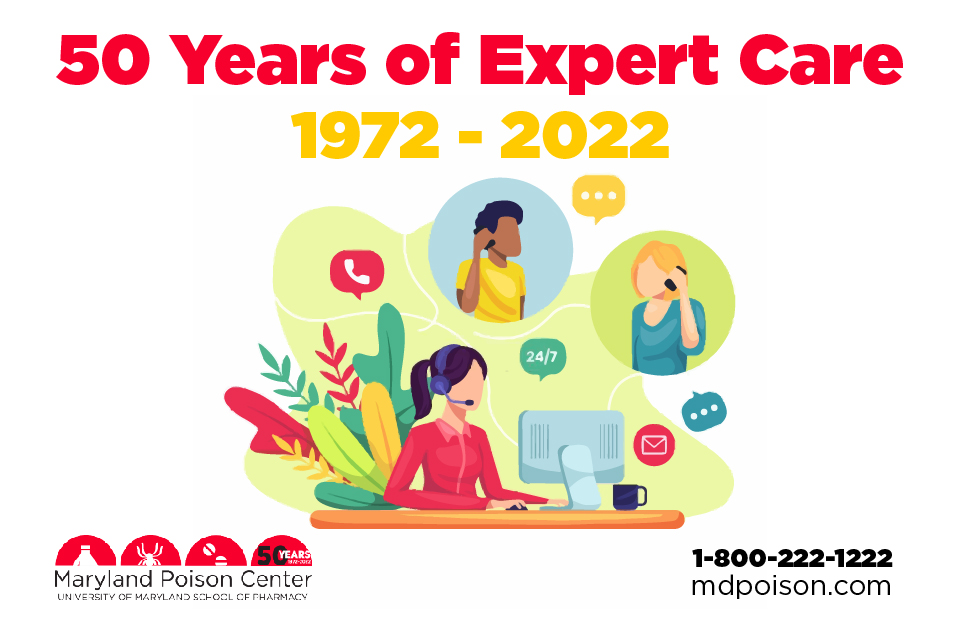Maryland Poison Center Celebrates 50 Years of Expert Care
January 26, 2022
Since 1972, it has been the mission of the Maryland Poison Center (MPC) to save lives and dollars by providing emergency triage, treatment, and prevention information to Maryland’s citizens and health professionals. Serving 4.1 million Marylanders in 21 counties and Baltimore City, the MPC is staffed 24 hours a day, 365 days a year by pharmacists and nurses who are certified specialists in poison information (CSPI).
The MPC, which can be reached by calling 1-800-222-1222, has answered approximately 2.5 million calls over the last 50 years from Marylanders dealing with a poisoning emergency.
The MPC is certified by the American Association of Poison Control Centers (AAPCC) as one of 55 regional poison centers in the country. All eligible specialists have been certified by the AAPCC as CSPIs. MPC specialists have more than 250 years of combined experience managing poisoning and overdose cases. In addition to the experience of the poison specialists, Executive Director Bruce Anderson, PharmD, DABAT, FAACT, and Clinical Toxicologist James Leonard, PharmD, DABAT, are board certified in clinical toxicology, and the center’s Medical Director Joshua King, MD, is fellowship trained and board certified in internal medicine, nephrology, and medical toxicology. Anderson is also a professor of pharmacy practice and science at the School of Pharmacy.
“Fifty years of service to Maryland is a wonderful milestone for the Maryland Poison Center,” says Natalie D. Eddington, PhD, FAAPS, FCP, dean and professor of the School of Pharmacy. “Over the decades, the Poison Center has adapted to changing times and continues to be a relevant and vital service to us all. I am proud of the impact they have in our state and proud that they are part of the University of Maryland School of Pharmacy community.”
MPC’s Role in Public Health Events
The MPC has been a public service through the University of Maryland School of Pharmacy since 1972 and has continued to grow over the years. During its first year, the center managed 5,600 cases and kept paper records. In 2021, the MPC managed more than 37,000 cases, with more than 80 percent of those cases involving human exposure, using a sophisticated electronic system to track and manage calls.
The MPC analyzes cases in real-time for trends and events that might be of public health significance, such as food poisoning, product recalls, and potential terrorism. Its specialists have helped during many public health events over the years, including:
- Gasoline ingestions in 1979 when long lines at gas pumps forced some to ration or siphon gas from one tank to another
- Cyanide contamination of Tylenol in 1982
- Train fire in the tunnel under Baltimore City in 2001 that resulted in toxic smoke being released into the air
- Anthrax attacks in 2001
- Carbon monoxide exposures from the use of generators during the blizzards and tropical storms of 2009, 2010, and 2011
- Abuse of synthetic marijuana and the new stimulant known as “bath salts” since 2010
- Mercury in skin lightening creams in 2011
- Administration of bystander naloxone beginning in 2015
- Newly designed laundry packets being ingested by children in 2015
- Opioid epidemic beginning in 2017, leading to Governor Larry Hogan declaring a state of emergency and bystander naloxone made available without a prescription. The MPC assists in tracking usage of the lifesaving drug.
- K2/Spice contaminated with brodifacoum leading to severe bleeding in 2018
- E-cigarette or Vaping Use-Associated Lung Injury (EVALI) in 2019
- COVID-19 pandemic beginning in 2020
- Chloroquine and hydroxychloroquine exposures
- Bleach and household cleaning products exposures
- Ivermectin exposures and general information
- Teaching collaboration with two additional regional poison centers (A-TEAM) to virtually educate medical professionals in toxicology during the pandemic
“Over the last 50 years, the Maryland Poison Center has answered the call about 2.5 million times,” says Jill Morgan, PharmD, professor and chair of the Department of Pharmacy Practice and Science at the School of Pharmacy. “Marylanders rely on the MPC’s pharmacists and nurses with specialized training and national certification to help manage poisonings and overdoses 24 hours a day/7 days a week. The center also provides education to health care providers and the community, saving health care dollars. The MPC is a service you hope to never need and are so relieved to find the experts there when you do.”
“Throughout the past 50 years and the variety of challenges over that time, the Maryland Poison Center has and continues to meet its mission. We save lives and save dollars,” says Anderson, the center’s executive director. “We also educate the next generation of pharmacists, nurses, and physicians on managing poisoning and overdose cases. We’re constantly monitoring cases reported to the MPC looking for potential public health events that may not otherwise be readily detected by an individual pharmacist or nurse at an individual hospital. It’s truly remarkable what the MPC has been able to accomplish over the past half century.”
How you can get involved with MPC
- Sign up for our e-newsletters: Poison Prevention Press (public) and/or ToxTidbits (health care professionals)
- The Maryland Poison Center debuted its Instagram account, follow @mdpoisoncenter
- Follow MPC on Facebook and Twitter for bi-weekly social media posts highlighting the last 50 years
- Visit and subscribe to our YouTube channel. New videos will be added throughout the year
- Visit our eAntidote blog for two new posts a month
- Join us for National Poison Prevention Week – March 20-26 – as we raise awareness of the MPC and share poison prevention tips.